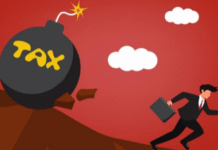New VAT rate from Jul 1, 2016 to affect consumers, start-ups
The government has finally agreed to a proposal of the International Monetary Fund on implementing the new value added tax, much to the worry for both consumers and small and medium businesses.
Economists criticising the move to accept the controversial IMF prescription on VAT said the expansion of VAT or indirect tax will weigh on common people heavily. They urged the government to streamline direct tax system so that evaders and black money holders are forced to pay more tax.
The agreement between the finance ministry and the IMF came last week with the IMF’s extended credit facility mission ending their two-week visit to Bangladesh.
The ministry also agreed that a gazette notification of the revised VAT launch date, July 1, 2016, will be issued soon.
The agreement has, however, dwarfed the recommendation of a NBR-FBCCI review committee on the new VAT law as the committee in its January report suggested a higher enlistment threshold for the turnover tax and introduction of multiple VAT rates.
Under the agreement, the VAT-free turnover threshold has been raised from current Tk 24 lakh to Tk 30 lakh, three per cent turnover tax will be applicable for annual turnover over Tk 30 lakh to Tk 80 lakh, it was learnt.
The NBR-FBCCI committee recommended for raising the VAT-free turnover limit to Tk 36 lakh.
‘To accept the recommendation to increase the enlistment threshold, and raise it from Tk 2.4 million of annual turnover to Tk 3 million (that is, the 3 per cent turnover tax will apply to businesses with annual turnover to Tk 3 million, while the VAT, at a rate of 15 per cent, will apply to businesses with annual turnover over Tk 8 million, as currently envisaged in the new VAT law),’ reads the agreed minutes between the IMF’s extended credit facility delegation and the finance ministry.
A single rate of 15 per cent VAT will be imposed on products and services on their annual turnover of above Tk 80 lakh, while existing package VAT and truncated system of VAT and tariff value system to determine the VAT amount would no longer exist.
Presently, around 75 sub-sectors under the services sector with their annual turnover, each above Tk 80 lakh, enjoy reduced VAT ranging between two per cent and nine per cent.
Under the new VAT rule, all these areas of business will be subject to 15 per cent VAT.
For instance, consumers now paying two per cent VAT on their purchases made in department stores will be subject to 15 per cent VAT once the new law will be introduced, a senior VAT official in the NBR said.
Besides, suppliers and procurement providers now pay four per cent package VAT, which will be 15 per cent from the next fiscal year.
NBR-FBCCI committee, however, earlier recommended for multiple VAT rate instead of 15 per cent fixed-rate.
‘We have agreed to implement the new VAT law, after months of indecision as business opposed the move, to keep going reforms in the revenue administration and raise revenue earnings of the government,’ a top finance official told New Age on Tuesday.
He said it was nothing wrong to accept the condition of the IMF as the lending agency had been providing the country with concessional loans.
Speaking at the programme, Federation of Bangladesh Chambers of Commerce and Industry (FBCCI) president Kazi Akram Uddin Ahmed last week said the single VAT rate at 15 per cent would be high for small businesses.
“The vibrant rural businesses would be hit hard by such high rate of VAT,” he said.
The finance ministry has also agreed two other points on the same issue.
These are—approval by the cabinet committee on public purchase of the procurement for the project management consultancy to manage the implementation of VAT law and approval on the combined tender for procuring hardware, software, networking and support services to ensure that the new VAT law encounters no hurdles in its implementation stage.
Economist Anu Muhammed talking to New Age said expansion of VAT would obviously impact on consumers. He advised the government for drive to increase tax income through direct tax and relieve commoners from indiscriminate indirect tax.
‘The latest move on streamlining VAT is the weakness lying in the revenue administration, as the system should concentrate on earning more from black money holders and powerful quarters of the society,’ Anu told New Age.
The IMF had deferred the release of the sixth installment of the US$ 1 billion loan last year after the government failed to lay out a fresh roadmap for implementing the new VAT law.
The sixth installment — around US$ 140 million — was scheduled for release in November last year.
The IMF board in April 2012 approved around US$ 1 billion for Bangladesh of which US$ 704 million has already been released in five installments. Before releasing each installment, the IMF reviews progress of the reforms it suggests.
The new VAT and SD law was passed in parliament on November 2012.
Source: New Age










